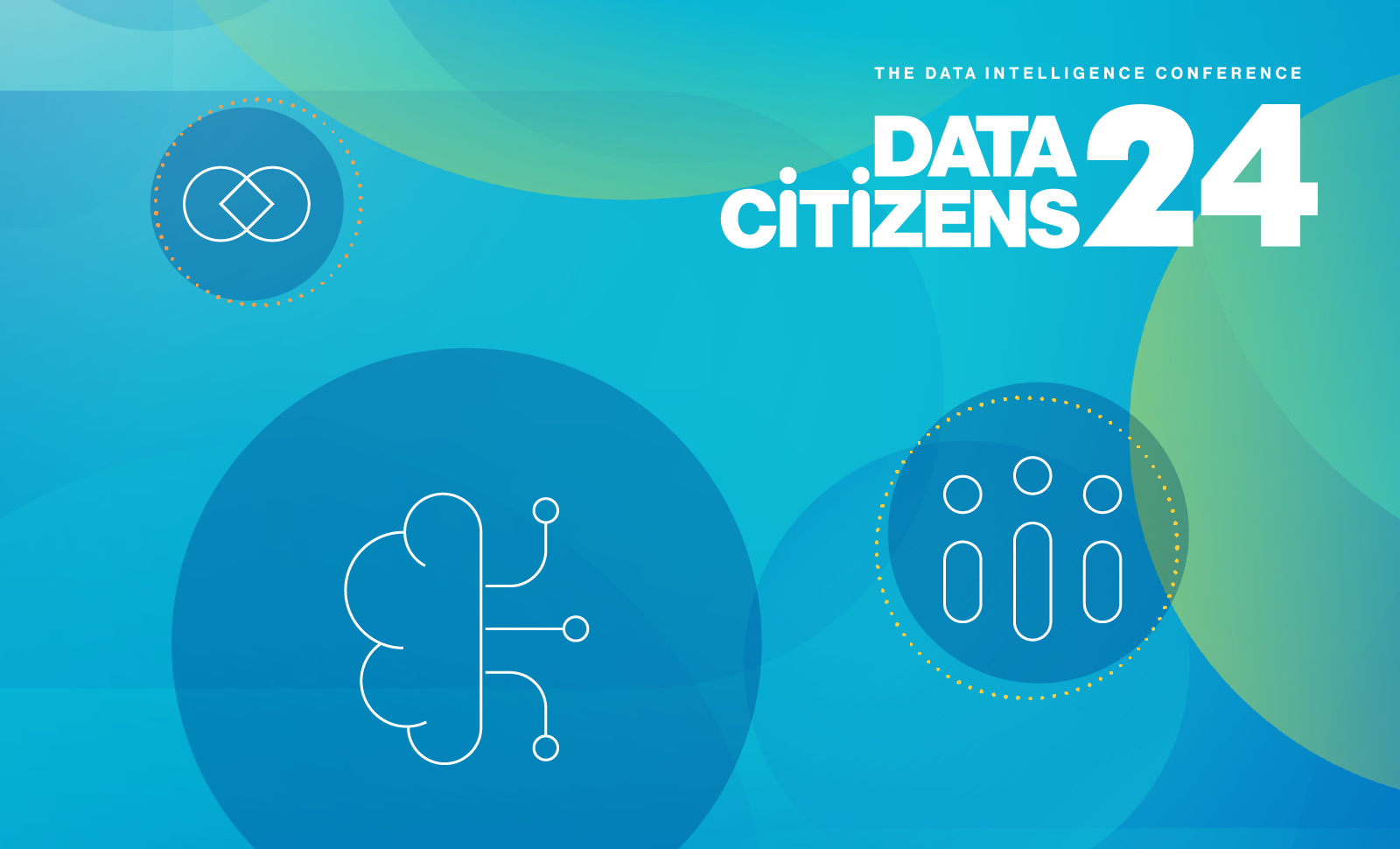There’s no denying that digital technology is a driving force endlessly propelling the business world further into the future. So it’s only natural to assume that the digital landscape is driven, shaped, and impacted by one very specific, very compelling facet — data.
As such, the way companies look at data has shifted entirely. Now, data itself has become an incredibly important part of an organization’s digital strategy. In fact, it’s often the main ingredient that companies base their digital landscape around.
But what exactly is the result of this shift? Typically this results in a mass of data coming from every direction — consumers, end-users, data citizens. And while a collection of information like this is useful, it can only do so much in this form. Truthfully, an enormous collection of data — raw and unanalyzed — is just that, an enormous collection of data. It can’t give insights, help companies make decisions, or provide guidance.
That’s where the conversation about data intelligence begins.
But what exactly is data intelligence? And why does so much of the conversation about digital transformation and digital maturity revolve around this key phrase? What’s so special about data intelligence? What does it bring to the table that makes it so unique and powerful?
This article is designed to not just answer those foundational questions but also help you explore the world of data intelligence from a more accessible place. Why? To show you that data intelligence is, indeed, an approachable process and a doable goal for all companies — no matter what size, scope, or industry.
The reality is that you don’t need to be a data whiz to understand the importance of data intelligence. And further, you don’t need an overly complex plan to take your company there.
All you need, at least to start, is a firm foundation of knowledge to help guide you on your data intelligence journey. And that’s precisely what this blog was designed to do.
What exactly is data intelligence?
It’s impossible to begin a comprehensive conversation about data intelligence without first covering the basics — defining data intelligence.
Though there are a lot of unique definitions of Data Intelligence floating around, we tend to describe it as simply and straightforwardly as possible.
At Collibra, we believe that Data Intelligence is the ability to understand and use your data in the right way.
To us, that definition is fundamental. Why? Because before you can get too deep into the processes, systems, and logistics of forming or adapting your own data intelligence cloud, you need to first understand what the overarching goal of data intelligence is in the first place.
Another way to think about data intelligence is to think of it as the output or the result of connecting the right data, insights, and algorithms together to do something amazing. This allows all data citizens to optimize processes, increase efficiency and drive innovation.
So, with this knowledge in mind, we can take it one step further and say that data intelligence is the unique set of processes, artificial intelligence, technology, and tools used by an organization to better use, analyze, contextualize, and understand their data to the best of their ability.
On a small scale, data intelligence can be as streamlined as coming up with a manual system to compare a few unique data sets. On a much larger scale, this can include digital tools like machine learning and artificial intelligence, data catalogs, data definitions, and so much more.
In other words, though the purpose of data intelligence is pretty uniform, the ways in which it is put into practice can be incredibly varied. It all depends on the size, scope, and goals of the company putting together a digital intelligence strategy.
Primarily, data intelligence is concerned with contextualizing and analyzing data to make it a more powerful, trustworthy, and informative tool for an organization. Ultimately, a data intelligence system, process, or platform should help a company use their data in more meaningful ways and allow them to make better, more informed business decisions in the future.
Obviously, data — and being able to analyze it and use it meaningfully and powerfully — is of supreme interest to most forward-thinking businesses eager to expedite their digital transformations. But beyond racing to the top of the digital maturity ladder, what’s the actual benefit of investing in a meaningful, sustainable data intelligence cloud or strategy? Keep reading — we’re going to cover that next.
The big business benefits of data intelligence
As we mentioned just a few sentences ago, the idea of data intelligence and digital transformation seem to go hand in hand.
But why exactly is that, and further, is digital maturity truly the only real reason organizations are chasing down data intelligence solutions? We’ll take that question even a step further and ask, “is it true that only certain types of businesses — like techy, digital-progressive businesses — can benefit from data intelligence?
The short answer to all of those questions is simply no.
The truth is that data intelligence clouds and solutions can do so much more for your organization than you might initially think. And further, there’s no one type of business that would benefit more than another by investing in data intelligence.
The most interesting thing about understanding the benefits of data intelligence is that each advantage ultimately feeds into another advantage. This creates a sort of snowball effect for your organization’s digital transformation. In other words, a high-quality data intelligence platform can help you take raw data and turn it into something incredibly insightful and meaningful.
And that concept is not limited to a certain type of organization with a certain number of employees or data sets. Companies within all industries and of all sizes can reap the massive benefits of investing in data intelligence, and we’re going to dive into that “why” right now.
Correct context for data sets
Having an enormous mass of data that you are analyzing is a good start for a data system — but not knowing how to provide context for that data can lead to disaster. Data is only as helpful as it is easy to understand. This means that the data your data citizens are using, accessing, and trying to apply must be qualified, categorized, and classified in the right context.
You’re probably thinking something along the lines of, “but I’m storing and categorizing my data with my data intelligence system, and things seem to be pretty organized — why should context for my data matter?”
That’s a good question. Think about data context in the following illustration. As head of the data team, you have a solid understanding of each and every data set that comes your way (ideally, anyway) from a data standpoint. Remember, a characteristic of a fantastic data intelligence system is designed to make sure that anyone can access and use data correctly, right?
With these things in mind, consider for a moment what might happen if someone from your organization’s marketing department requested data to help them design an upcoming marketing campaign. This is where data context matters. Not only do you need to understand the context of specific data sets in order to send them the right data to analyze for their campaign, but they also need to be able to understand the context of the data sets you send in the first place.
For this reason, a well-designed data intelligence system can make all the difference. A highly organized data intelligence system can provide you with easy, streamlined, and automated ways to better categorize and classify data to provide simple, straightforward context. In our opinion, the level of context every data set provides should make it easy for anyone (no matter who they are in your company) to not only understand that data correctly but use it in the right context, too.
More trustworthy data and improved data quality
When it comes to data, there’s a cardinal rule that everyone should follow in order to use data correctly: your data is only helpful if you can trust its quality.
When we say bad quality data, we’re not necessarily putting the blame on you. There are a lot of reasons data could be considered “untrustworthy” or “bad data.” For example, bad data can lead to making bad business decisions, give you false or blatantly incorrect information, or offer updated analysis that doesn’t apply to current conditions.
Why is untrustworthy data so bad? Because ultimately, when data is of bad quality, it can provide bad results, drive teams to make bad decisions, and even discourage data citizens from using data in the first place. Bad or low-quality data can be the results of data that is:
- Unclear
- Inaccurate
- Stale
- Unreliable
- Untraceable
And more, of course.
Which makes sense, right? If you can’t trust the quality of your data, there’s no way you can trust the end result of whatever project you’re working on based on that data.
A reliable data intelligence system can help you monitor the quality of your data, provide real-time lineage and cataloging to ensure the sources of that data are trustworthy, and keep track of how that data changes over time to provide more context on its quality.
That means, with the right data intelligence system on your side, you can seamlessly improve the quality of your data, making it a far more trustworthy source for your team.
Empowers data citizens to become data-driven
As we mentioned before, data intelligence is all about helping organizations analyze and better use their data to make more insightful decisions.
So, of course, a top-notch data intelligence platform must keep the data citizen in mind. When you invest in a high-quality data intelligence platform, system, or process, you should be opening the door to making data easier, more accessible, highly contextualized, and more seamless for your data citizens.
This means a data intelligence system worth its salt is going to empower your data citizens to use, analyze, and understand data better than ever before.
A high-quality data intelligence platform can take a company that’s void of data literacy and transform it into a data-driven, data-first organization that can confidently place any of its data citizens in the driver’s seat when it comes to data analysis and use.
Improves data accessibility
That enormous mass of data we discussed earlier? It’s good that you have it, sure, but ask yourself — how accessible is it really for your fellow data citizens? If you don’t have a reliable, easy-to-understand data intelligence cloud in place, the answer is that it’s likely not very accessible.
Streamlined access to data is a must for companies who want to invest in digital transformation, build a data culture, and empower their employees to not just implement data into their daily tasks but understand it to its very core.
With an organized, streamlined system in place for data intelligence, your data citizens will be more prepared than ever to not just access but also understand the data they’re using.
Data lineage and auditing
A high-quality data intelligence platform won’t just help you store, access, and analyze your data; it will help you better understand its constant evolution.
The unique thing about data is that it’s not always easy to trace, source, or trust.
So, being able to track a data set’s lineage (especially on a macro scale when you have millions of data sets — or more) can not only help provide crucial answers about the context of that data but also help you when it comes time to audit that trustworthiness of that data.
Guides better business decisions through improved data management
The ability to trust your data, contextualize your data, empower your data citizens to use that data correctly and cohesively, track your data, and generally just have a more cohesive understanding of your data all contributes to one very positive outcome — you’ll be able to make better business decisions.
Data that’s effective, trustworthy, high-quality, properly analyzed, and streamlined won’t just help you look at your data more comprehensively; it will help you see a clearer, more directive picture of what that data means and how it should guide your decisions.
And the beautiful thing is, these decisions can come from and impact almost every corner of your business. For example,
- Data from your finance department can be better interpreted to help you cut costs or drive more profits
- Data from your marketing department can help you better target your customer base and bring in more revenue
- Data from your legal department can help you create better processes that mitigate or eliminate excessive risk.
Highly functional, easy to access, and operationalized data can make a difference from end to end in your business — no matter your organization’s industry, size, scope, or niche.
The main takeaway here? Data is key. But here’s the catch — if you can’t properly understand and contextualize all of your raw data, you’ll never get to this point of being able to make meaningful, business-altering decisions.
And that, perhaps, is one of the most compelling business benefits of a high-quality, streamlined, and seamless data intelligence system.
Why do you need data intelligence?
With the way it’s thrown around in the digital world, it’s easy to think of data intelligence as a buzzword. But truthfully, it’s so much more than that. Yes, it’s a bit of a hot topic right now, but data intelligence is not just a cute slogan or an abstract concept designed to sell some sort of data platform.
Data intelligence is a crucial part of a company’s digital transformation, its growth in an evolving world of technology, and a guiding light on the path toward making more insightful business decisions.
But more importantly, data intelligence is optimal, it’s achievable, and it’s hugely beneficial.
In this operating environment — awash in massive data volumes, buffeted by a constant flow of new technologies that will deliver more data, under pressure from evolving compliance mandates, and always in pursuit of digital transformation — data intelligence is more than just helpful. It is vital.
However, this ideal state can only be realized when it’s fully understood. There isn’t a one-off tactic or resource allocation that will get it done.
This environment requires more than just a desire to optimize data and reach a point of data intelligence. It mandates plans, systems, and technologies to support enterprise-wide data collation and inter-departmental collaboration.
It goes even further than that, though. It’s not enough to just develop a system — it’s crucial to create metrics to check and ensure that the system is working while providing opportunities for changes that can be made along the way to adjust and enhance each step of the process.
And, of course, this isn’t a process that can happen overnight or immediately (as much as we wish it could). If your enterprise or organization is like many of the modern ones today, amassed data is locked away in disparate silos, which can, unfortunately, drain resources and clog processes.
Data intelligence means more than just adopting a new system and ignoring all the old data you’ve accumulated. It means going above and beyond to change that dynamic, unlock the value of in-house and incoming data, and work its magic by transforming it into a strategic and competitive asset.
Data intelligence use cases
Though data intelligence can help organizations achieve more than just these use cases, we believe these three are the most telling and crucial.
Data intelligence can grow your business
Growing the business is revenue-focused. Data intelligence helps organizations grow their businesses by enabling business analysts to find, access, understand, and trust their data so they can use this data to make impactful business decisions. This leads to increased revenue via customer cross-sell, increased revenue via improved marketing campaigns and product launches, and improved net sales margins.
Data intelligence can run your business
Running the business is cost-focused. Data intelligence can help organizations reduce IT operations and maintenance costs, reduce duplicate data spending, and reduce business performance/reporting spending.
Data intelligence can protect your business
Protecting the business is risk-focused. Data intelligent products ensure an organization’s data is trustworthy and used in a compliant manner. This results in avoided regulatory fines and penalties, avoided data breaches, and increased productivity in compliance-related legal activities.
How do you achieve data intelligence?
Achieving data intelligence is, unfortunately, not easy. Organizations must first establish a governance foundation as their primary plan, then scale from there. It’s important for organizations to think about the technology and look towards total digital transformation within their organization; they must look at the big picture. To do this, an organization needs to consider the following factors.
What’s often missing in these infrastructures is a foundation that offers full visibility across the entire data landscape.
Many organizations have a heterogeneous mix of data management technologies that grew over time, and the fragmentation leads to a siloed network.
A comprehensive, cloud-based platform can ensure enterprise security and scale up to meet specific standards for reliability, privacy, and compliance. It’s all about the purpose — the data should be secure and compliant, but it must also serve business needs.
There should be a full complement of solutions that:
- Automate governance and privacy
- Extract the right data regardless of location
- Apply a single definition to ensure that users are building on the same foundation
- Prioritize consent, usage and retention policies
- Rely on valid data transparency and lineage to deliver meaningful business intelligence
Organizations must remember that technology is dynamic — there are always innovations coming down the pike, and it’s important to make judgments on each as they emerge. As a result, all infrastructures must have the flexibility to integrate with the best of these.
But there’s an even more important variable here. Data intelligence is a people and process issue; intelligence is a fundamentally human characteristic, and so we need policies and processes that drive knowledge sharing and collaboration.
Your path toward data intelligence with Collibra
There’s no golden rule here — every institution must evaluate its own philosophy and network settings to create a full-fledged data culture.
To achieve data intelligence, the core mission is to make it easier for knowledge workers to find the data they need, learn from it, add to it and collaborate with it.
Data intelligence doesn’t help only a few executives or particular disciplines; it’s all-encompassing and helps reimagine every function across the enterprise. It gives everyone the power to use data to solve problems, implement ideas and grow businesses. It fosters collaboration to drive business value.
It enhances operational efficiency and identifies new revenue opportunities. With Collibra Data Intelligence Cloud, organizations have a central platform to automate workflows, deliver trusted insights and ensure data intelligence across your organization.
Data intelligence enables an organization to get the most out of their data by turning data into a competitive and strategic asset. This happens when data is seen not as an end in itself but as a powerful weapon to deliver new insights and drive better decisions. Data intelligence gets us there.




